耶鲁专升本2011年公共英语易错动词
专升本英语动词短语

专升本英语动词短语1、动词+aboutbring about引起,使发生care about关心,对……有兴趣come about发生,产生;造成hang about/around 闲逛;逗留;徘徊hear about听说speak/talk about谈论set about 着手,开始think about思考worry about为……担心2、动词+awayblow away吹走;吹散break away摆脱,脱离(政党)等;放弃;打破(陈规)carry away拿走,使入迷,运走;使失去自制力clear away清除掉,消散die away逐渐消失,(风、声音)减弱fade away 褪色;慢慢褪去get away (from)逃脱;离开;出发;把…送走;寄走give away背弃,泄露,分发;赠送;出卖;放弃(机会)等go away 走开;离去;(岁月)流逝;死去keep away from…使避开;使远离pass away去世;消失;度过put away收拾起来,存起来;放置暂时不用run away 逃走;携带…逃走send away让走开shy away from 退出;躲避stay away from 离…远点take away拿走throw away扔掉turn away把……打发走wash away 洗掉;(洪水)冲垮wear away磨掉,消耗3、动词+backbring back 拿回;使…回想起call back / ring back 回电话turn back 回来get back 回来;恢复;要回;带回call back回电话come back to life 恢复健康draw back 后退fight back 反击get back 回来,恢复,要回,带回give back归还;送回;恢复;后退hold back控制住keep back隐瞒,忍住kick back 踢回look back on…回忆;回顾pay back 偿还put back 放回原处;拨回时钟;延期推迟take back拿回,收回throw back 扔回去turn back 回来write back 回信4、动词+forapply for申请ask for要求得到beg for乞求call for要求,需要1care for关心,喜欢change for用……换charge for收费,要价come for来拿,来取hope/wish for希望得到hunt for寻找long for渴望look for寻找run for竞选search for查找seek for寻找stand for代表,表示take for误以为……是wait for等候5、动词+downbreak down坏了,垮了,分解bring down使……降低,使倒下burn down 烧毁blow down 吹倒;吹落break down 出故障;失败;崩溃;分解bring down 使下降;使泄气come down 下来;下降cut down 减少开支;砍倒die down (风、雨、火、植物,浪)平息fall down 落下;跌到;倒塌;失败;证明是不行的calm down平静下来come down下落,传下cut down削减,砍倒go down (价格)下降;(日、月)落下;(风、浪)平静;(船)下沉;倒闭hand down 递给;传递下来;世代相传hold down 制止;控制;缩减let ** down 使…失望pass down 传下来put down记下,写下,镇压settle down 安家shut down (指工厂)关闭;停工slow down慢下来take down记下,记录;拆除;咽下tear down 拆毁,拆除turn down拒绝;关小;调低,婉言谢绝6、动词+ataim at向……瞄准call at拜访地点come at 向……袭击glance at匆匆一瞥glare at怒视knock at敲门,窗等laugh at嘲笑look at看,注视point at指向run at冲向,向……攻击shoot at向……射击shout at冲某人嚷嚷smile at冲某人笑stare at凝视strike at向……打击tear at用力撕wonder at惊讶work at干……活动研究27、动词+fromdate from始于……时候die from因……而死differ from与……不同hear from收到……来信keep/stop/prevent from不让……做learn from向……学习result from由于separate from把……分离开suffer from受……苦8、动词+ofapprove of赞成become of发生……情况,怎么啦complain of抱怨consist of由……组成die of死于dream of梦到hear of听说speak of 读到talk of谈到think of想到9、动词+offbreak off突然中断;停止;与…断绝关系blow off 吹掉;埋怨;炸掉carry off带走;赢得;获得奖品;叼走come off脱掉,褪色;举行;结果cut off切断,断绝call off 叫走;取消cut off 切下;剪下;切断cross off/out 勾掉;划掉die off 相继死去fall off 跌落;减少;脱落;衰退get off下来;下车;脱下(衣服);(飞机)起飞give off散发出go off熄灭;动身去某地;炸锅hang off / back 忧郁;畏缩hold off 推迟;抵挡;不使…接近keep off避开,勿走近knock off把……撞落leave off''中断pay off还清put off延期,推迟ring off挂断电话shut off 关掉;切断电源see off送行set off出发show off炫耀start off出发take off脱下,起飞turn/ switch off关掉wipe off 擦掉;还清(债务)10、动词+onbring on使……发展call on拜访carry on继续,进行depend on依靠feed on以……为生have on穿着insist on坚持3keep/go on继续live on以……为生look on 旁观move on 继续移动,往前走pass on传授,传递put on穿上,戴上,上演rely on依靠spend on在……花钱take on 雇佣,呈现try on试穿turn/switch on打开10、动词+onbring on使……发展call on拜访carry on继续,进行depend on依靠feed on以……为生have on穿着insist on坚持keep/go on继续live on以……为生look on 旁观move on 继续移动,往前走pass on传授,传递put on穿上,戴上,上演rely on依靠spend on在……花钱take on 雇佣,呈现try on试穿turn/switch on打开11、动词+outbreak out爆发bring out 阐明,使表现出burst out迸发call out 大声叫喊carry out 执行check out 结账离开come out出来;花开放;出版;得…名次cross out划掉drop out 辍学;掉落figure out 算出find out查出,弄明白get out (使)出去,逃脱,(消息等)泄漏,说出,公布give out发出(气味、热)等;分发;耗尽;疲劳go out 熄灭;(年月)结束;(衣着)过时;倒塌;罢工hand out 散发,分发;施舍help out救助hold out坚持下去,伸出;支撑;提出keep out of使不进入,挡住leave out省略,删掉,遗漏;忽略let out泄漏(机密);发出(喊叫)look out(for)当心,堤防,小心make out 理解,看清楚;断定pay out 付出;得到报应pick out选出,领会,弄明白point out指出pull out 拉出;拔出;抽出;取出;(车,船)驶出put out 扑灭,生产;出版;赶走run out用完send out发出,派遣4set out出发,着手speak out大胆讲出take out 拿出think out 想出try out 试用,试验turn out 结果是,证明是,生产watch out (for)小心wear out穿破,使...疲劳,劳累work out算出,想出办法等12、动词+inbreak in强制进入,插话bring in引进,使得到收入call in召集,来访cut in插入drop in拜访fill in填写get in收获,进入give in让步hand in上交join in参加look in来访,参观persist in坚持result in导致succeed in在...获得成功take in接纳,吸收13、动词+intoburst into闯入,迸发change into把...变成divide into把...分成look into研究,调查put/translate into把...译成run into碰到turn into变成14、动词+overcheck over 核对;检查come over 走过来fall over跌倒,摔倒,绊了一跤get over克服go over审阅,检查,研究look over翻阅,检查roll over翻滚run over压死,看一遍think over仔细考虑turn over翻倒,细想take over 接管;接替;继承watch over看守,照看15、动词+toadd to增添agree to同意attend to处理belong to属于bring to使苏醒come to 共计,苏醒compare to与...相比,把...比作devote to贡献给get to到达lead to导致,通向object to反对point to指向refer to谈到,涉及,参阅5reply to答复see to处理,料理stick/hold/keep to坚持,忠于supply to为...提供turn to向...求助,查阅write to写信给16、动词+upblow up 告吹;发脾气;(风雨)等发生break up分解,破碎;结束;(士气)衰弱;(关系)破裂bring up抚养,呕吐,提出build up建立burn up烧毁call up 给…打电话;使人想起catch up赶上check up=check through=check over 核对;检查clear up整理,收拾,放晴come up走近;发芽;提出来,出现(问题;建议)cover up 掩盖;包庇cut up切碎;使…难过divide up分配do up整理,包装,打扮eat up吃完end up总结fix up修理,安排,装置get up起床;起立;(风、浪、火)大起来;打扮;安排;组织give up放弃,献出,把…送交;使埋头于…go up增长,上涨grow up 成长,长大hang up / off 挂起;挂断电话hold up耽搁,使停顿,举起;竖起;支撑hurry up赶快join up联结起来,参军keep up保持;继续(某活动)lay up积蓄light up 照亮;(脸上)呈现高兴的情绪look up抬头看;查阅;看望;(身体)好转make up弥补;赔偿;编造;组成;虚构,化妆open up开创,开辟pick up举起;拾起;(身体)好转;中途接入;(非正式)学会;偶然发现/买到/得知/养成习惯等pull up 拔出;拔掉;使车停住;停车put up 搭起,架起,安装,住宿,张贴,盖起ring up打电话save up 节省send up发射set up架起,建立show up=turn up 露面shut up 关门;关在里面;闭嘴sit up熬夜speed up加快速度stay up / sit up 熬夜不睡觉,挺住take up开始学,从事,占有(时间,空间)tear up撕碎think up 想出throw up呕吐turn up开大,出席,出现use up用完wind up 上紧(钟表)发条;使紧张;兴奋;结束work up 激发(情感)6wrap up 席卷而去;包起来17、动词+throughcheck through核对get through通过,干完,接通电话go through审阅,检查,学习look through 翻阅,看一遍,仔细查看pull through渡过危机,康复put through接通电话see through识破18、动词+withagree with同意,与...一致begin with以...开始combine with与...相联合compare with与...相比cover with用...覆盖deal with处理,对付do with处理,需要end with以...结束equip with以...装备meet with遇到,遭受play with 玩,玩弄provide with 以...供给supply with以...供给talk with同...交流其他常用词组(to为介词)object to 反对attend to 办理;处理;注意听;照顾look forward to 期待;盼望be opposed to 反对devote… to 贡献给…stick to 坚持lead to 导致pay attention to 注意到be related to 与…有关be limited to 限制到…be applied to 应用于…see to 注意做到;务必做到;负责…refer to 提到;指的是turn to 翻到;(1) break:1. break down (机器)坏了;(精神,健康)夸了My car/ The machine/ The bridge has broken down.She broke down when she heard the news.His health broke down.2. break off (忽然)中断,停下;与人断交He broke off in the middle of his speech.break off (relations) with somebodyHe has broken off with Tom.3. break up 驱散,散开 break up the meeting/ crowdWhen do you break up? 何时放假?4. break into 破门而入5. break out 爆发(2) bring:1. bring about 带来;造成 causeWhat brought about the quarrel ?2. bring up 培养长大;提出bring up somebodyShe has brought up five children. Sb be well/ badly brought up (3)call:71. call for 要求;接人(取物)This sort of work calls for a lot of patience.call for sb / the package/ the dress2. call off 取消The meeting was called off.3. call on 访问;请求call on sb I called on him the other day.call on sb to do He called on me to dance with him.4. call up 给打电话 call (ring) sb up(4)carry:1. carry out 实现;执行 carry out a plan/ programcome:1. come about 发生(常与how连用)How did sth come about? (北京安通学校提供)How did the accident come about?2. come across 偶遇 run into run acrossI came across an old friend last night.3. come up (意外)出现,发生come up with 提出Don’t worry if anything comes up?come up with a suggestion/solution4. come to 苏醒,恢复知觉5. come out 出版6. come over 从远处过来 Please come over and see us if you have time.(5)cut:1. cut down 减少(消费)2. cut in 插嘴3. cut off 切断(6)get:1. get along 相处;进展 get onHow are you getting along with your homework/ studies/ task/ new boss?2. get through 完成,通过;接通电话get through the examination/ workIt is hard to imagine how people will get through the winter without electricity. The operator finally got me through.3. get over 克服;恢复 get over one’s cold /illness4. get away 离开,脱身5. get in 到达;收割6. get down 写下,记下7. get up 起床(7)give:1. give away 泄露2. give in 屈服,让步3. give up 放弃,停止 give up smoking4. give off 散发出(气体,气味等) The water gives off a badsmell.(8)look:1. look down on/upon 看不起,轻视2. look up to 尊敬 look up 查(字典)3. look forward to 期望,盼望(北京安通学校提供)4. look into 调查 He promised to look into the matter.5. look out 当心,注意 Look out, a train is coming!6. look after 照料 look after the baby(9)make:1. make out 理解 I can‘t make out what he means.figure out 算出,理解 I tried to figure out what‘s in his mind.2. make up 虚构 No one believes the story. He made it up.3. make up (for) 弥补 How can I make up for the time I havelost?(10)pass:1. pass away 逝世 The old man passed away in his sleep.2. pass out 晕倒 He passed out at a meeting.8(11)put:1. put off 推迟 put off the meeting/ party2. put on 穿上,戴上增加 He has put on a lot of weight recently.3. put up 举起;提供食宿If I visit you at the weekend , will you be able to put me upfor one night?4. put up with 容忍If I were you , I wouldn‘t put up with his bad temper anylonger.(12)take:1.take in 欺骗 He took me in with his story. He was nicely taken in.2. take over 接管 He will take over my job while I am on holiday.3. take to 喜欢I took to him at once, and we’ve been friendsever since.4. take up 开始从事; 占去 Now many young people take up writing.I’m sorry for having taken up a lot of your time.5. take off 起飞;脱下 The plane will take off on time.(13)turn:1. turn down (音量)调低;拒绝The company turned down his request.2. turn out 生产;结果是The weather turn out to be fine.3. turn to 求助于You can turn to me if you are in trouble.4. turn up 出现I waited half an hour for my friend, but he didn’t turn up.9。
专升本英语易混淆词组
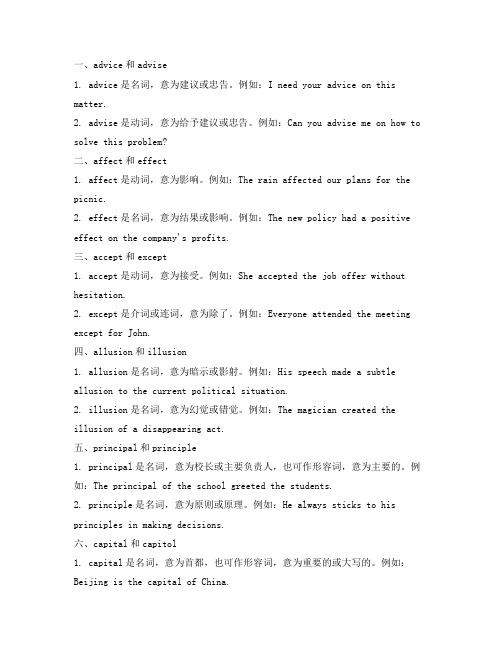
一、advice和advise1. advice是名词,意为建议或忠告。
例如:I need your advice on this matter.2. advise是动词,意为给予建议或忠告。
例如:Can you advise me on how to solve this problem?二、affect和effect1. affect是动词,意为影响。
例如:The rain affected our plans for the picnic.2. effect是名词,意为结果或影响。
例如:The new policy had a positive effect on the company's profits.三、accept和except1. accept是动词,意为接受。
例如:She accepted the job offer without hesitation.2. except是介词或连词,意为除了。
例如:Everyone attended the meeting except for John.四、allusion和illusion1. allusion是名词,意为暗示或影射。
例如:His speech made a subtle allusion to the current political situation.2. illusion是名词,意为幻觉或错觉。
例如:The magician created the illusion of a disappearing act.五、principal和principle1. principal是名词,意为校长或主要负责人,也可作形容词,意为主要的。
例如:The principal of the school greeted the students.2. principle是名词,意为原则或原理。
例如:He always sticks to his principles in making decisions.六、capital和capitol1. capital是名词,意为首都,也可作形容词,意为重要的或大写的。
2011届高考英语易错题归类解析[共35页]
![2011届高考英语易错题归类解析[共35页]](https://img.taocdn.com/s3/m/33753a41be1e650e52ea997d.png)
2011届高考英语易错题归类及解析(一)形容词与副词类1.We don‘t care if a hunting dog smells _________, but we really don‘t want him t o smell _____.A.well, wellB.bad, badC.well, badlyD.badly, bad【陷阱】容易误选B,认为两个smell 均为连系动词,后接形容词作表语。
【分析】最佳答案为D。
句中的第一个smell 为实义动词,意为―闻气味‖、―嗅觉‖,s mell badly 意为―嗅觉差‖;第二个smell 为连系动词,意为―闻起来(有某种气味)‖,smell b ad 意为―闻起来气味难闻‖。
全句意为―我们并不介意一条猎狗的嗅觉不好,但我们的确不希望它的气味难闻‖。
2.―_________ do you think of your English teacher?‖ ―Oh, he is an _________ ma n.‖A.What, interestingB.What, interestedC.How, interestingD.How, interested【陷阱】容易误选D,认为第一空应填how,表示―如何‖;第二空应填interested,因为有的书上说–ing 形容词主要说明事物,-ed 形容词主要说明人。
【分析】其实最佳答案应是A。
英语中表示汉语的―你觉得……如何?‖时,可用How d o you like ...? 或What do you think of ...? 注意两者搭配不同,即like 与how 搭配,t hink of 与what 搭配。
另一方面,有的书认为:-ing形容词说明事,-ed形容词说明人。
此说法在很多情况下是可行的,但表述欠严谨。
严谨的表述应该是:表示使(别)人感到如何, 用-ing形容词;表示人自己本身感到如何,用-ed形容词。
动词易错易混点
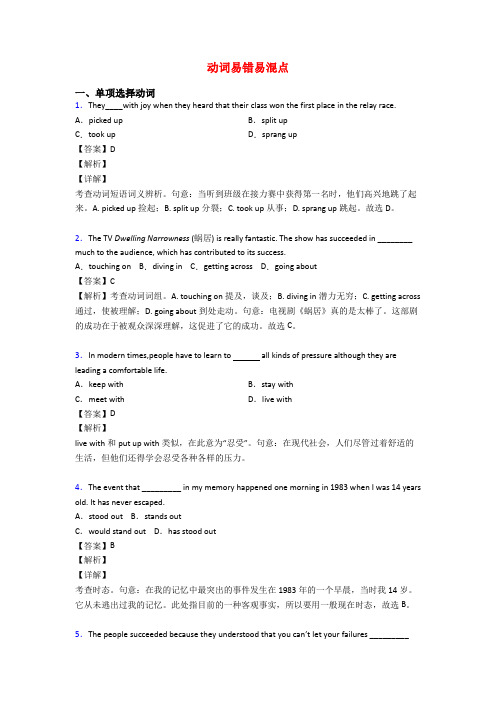
定义;B. decline下降;C. qualify限定;D. simplify简化。句意:人们成功是因为他们明白,你不能让失败定义你——你必须让失败教会你。故选A。
6.If you ever aren’t sure whether you have bought the very best smartphone, just _________ “good enough.”
A.stood out B.stands out
C.would stand out D.has stood out
【答案】B
【解析】
【详解】
考查时态。句意:在我的记忆中最突出的事件发生在1983年的一个早晨,当时我14岁。它从未逃出过我的记忆。此处指目前的一种客观事实,所以要用一般现在时态,故选B。
【答案】A
【解析】A考查动词短语。句意:--很遗憾,纳尔逊曼德拉去世了。--但他将继续留在世界各地的人们的记忆中。A以…为生,靠…为食;B继续停留;C继续;D穿上。故选A。
点睛:要学会总结动词短语的规律,以便在英语学习中达到汉语中‘识字不识字,先识半个字’的境界。具体:1.在每个部分找出自己最熟悉或者最理解的短语,并根据该短语助记总体意思;2.熟记动词本身所具有的全部意思;3.重点根据小品词在该项中的总体意思结合动词本身的意思,理解自己最不理解和不熟悉的短语4.脱离汉语,只看英语动词短语,并放到具体句子和场景中认识动词短语5.注意有些短语意义很接近,这要结合例句和上下文掌握它们的用法
9.-----It’s a pity that Nelson Mandela passed away.
------ But he will __________ in the memories of people worldwide.
易错点12 易混动词(短语)辨析(二)(解析版)

易错点12易混动词(短语)辨析(二)【难点突破】Group 1 accept, receiveGroup 2 advise, suggestGroup 3 borrow, lend, keepGroup 4 develop, developing, developed, developmentGroup 5 die, dead, death, dyingGroup 6 speak, say, talk, tellGroup 7 cost, pay, spend, takeGroup 8 bring, take, carry, get, fetchGroup 9 thank, thanks, thanks for, thanks toGroup 10 win, beatreceive指客观上的收到;accept指主观上的接受1.Mary ________ a flower, but she didn’t ________ it.A.received; accept B.receive; accepted C.accepted; received2.—Do you know about Jim’s party?—Yes. I ________ his invitation yesterday. I am thinking about whether I will go there or not.A.received B.accepted C.offered D.requested 3.Susan ________ a camera from her friend, but she didn’t ________ it because it was too expensive.A.received; accept B.accepted; receive C.accepted; accept D.received; receive 4.Mary ________ a gift from Tina, but she didn’t seem to ________ it.A.received; accept B.received; receive C.accepted; accept D.accepted; receive 5.—I’ve tried my best, but I still failed.—Don’t lose heart. You should learn to ________ the result and keep tryin g.A.accept B.receive C.record D.prevent1.A【详解】句意:Mary收到了一束花,但是她没有接受。
耶鲁专升本高频词汇记忆法

耶鲁专升本高频词汇记忆法A篇发布者:耶鲁外语阅读:638次发布时间:2010-11-3abandon vt.效率助记→a(一个)+bandon(音似:板凳)→一个坐冷板凳的球员,就是被教练“放弃”了。
短语→abandon oneself toabound vi.充满助记→abo+und(涌上来)→东西多得要溢出来了→充满短语→abound withabsorb vt.吸收助记→ab+sorb(吸) →吸收短语→to be absorbed inabstract adj.抽象的 v.转移注意力助记→abs(away)+tract(拉)→把东西拉出来→抽象的短语→abstract sb’s attention fromaccess n.享有…的机会助记→ac(to)+cess(走)→走过去→接近、进入…的机会短语→have access toaccomodation n.[常pl.]住处助记→可以依靠的|əkɔmə|+dation(station站)→可以依靠的站→住处accomplish vt.完成、实现助记→finish(完成)→(完美的)完成account vi.说明…的原因 n.账户助记→大把钱进account(账户),职员要求account(说原因)短语→account for…;take sth. into accountaccustom vt. 使习惯于助记→ac(to)+custom(习惯) →使习惯于短语→accustom oneself toacknowledge vt. 承认助记→ac(to)+know(知道)+ ledge→人人都知道,不得不承认短语→be acknowledg e as…被公认是…acquaint vt. 使熟悉助记→ac(to)+quaint(知道) →使熟悉短语→acquaint oneself withadapt vi. 适应短语→adapt toadjust vt.调整、调节助记→ad(to)+just(正确) →使正确→调整、调节短语→adjust (oneself) toadvantage n.优点助记→advant(前进)+age(表状态) →前进,领先的状态→优点短语→take advantage ofaffect v.影响区别→effect n.影响affinity n.强烈的爱好或吸引力短语→have affinity for= like sth. \doing sth.afraid v.害怕短语→be afraid ofallergic adj.过敏的助记→蚊虫叮咬会allergic短语→be allergic toadvise v.建议 (n.advice)短语→advise sb. to do sth.allure v.诱惑;引诱短语→allure ab. into sth.alternative adj.供选择的助记→alter(改变)+native(本土的) →改变本土的来选择→供选择的amuse vt.逗乐助记→a+muse(缪斯,古希腊文艺女神) →一个文艺女神给大家快乐→逗乐短语→amuse oneself by\ with 以…自得其乐annoy vt.使烦恼助记→发音“暗恼”→使苦恼短语→be annoyed with 因…而感到烦恼apology n.道歉、谢罪短语→mak e an apology to sb. forappeal v.或n. 呼吁、恳求短语→appeal tobare vt. 露出,暴露短语→to ~ one’s heart to …bargain n. 讨价还价短语→to ~ withbarrier n. 障碍base vt. 在…基础之上短语→base … on…bear v. 记住某事短语→bear sth in mindbend v. 弯曲短语→bend one’s efforts for …benefit n. 益处短语→get benefits from …bound adj. 必然的短语→be bound up in …bind v. 捆绑短语→to bind sb. with记忆口诀: 路遇barrier, 不得不bend, bind 在一起,这就是bound 一定会有benefit.boost v. 提高助记→boot (音似:步)+(看做stand) →一步比一步高→推进短语→to boost the price of …bore vt. 使厌烦词源→原义是“钻孔机钻孔”,钻孔时发出的声音单调乏味,没有韵律可言,很让人厌烦,因此该词引申为“使厌烦”短语→be bored with …boom vt. 迅速发展助记→boo(看做book书)+m→全国书市繁荣→迅速发展bracket v. 括起来助记→用篮子basket 括起来bracket短语→to bracket … with …brake n. 刹车助记→原义是停下马儿不前进,现在没马了,所以变“刹车”短语→put a brake on…brand v. 打上烙印 n. 商标助记→有了brand, 商品就被brandbreed v. 养助记→没有面包(bread)就养(breed)不活孩子。
耶鲁内部专升本语法词汇复习题

耶鲁内部专升本语法词汇复习题1. Lucille __B_ at the dance tonight, nor will Peter.A. can’t beB. won’t beC. may not beD. will be2. No one can avoid B by advertisements which can be seen everywhere.A. to be influencedB. being influencedC. influencingD. having influenced3. The big room was almost empty D a table or two.A. besidesB. exceptC. in addition toD. except for4. —Did you like the book I gave you?—___A____ the novels that I’ve read, I enjoyed this one the most.A. Of allB. All ofC. For allD. From all5. In spite of high divorce rate the __D_____ of marriage remains popular.A. habitB. stateC. practicedD. institution6. The people who objected to the new approach were told that since work had already started, there was no point in C .A. denyingB. protectC. protestingD. competingB. complainedC. accusedD. charged8. The new power plant is reported __B_____ within three years.A. having been completedB. to have been completedC. to have completedD. to complete9. We have not fixed the date ___C____ we shall start our holidays.A. andB. thatC. whenD. which10. Without air, __A_____ no wind or rain.A. there would beB. there will beC. there have beenD. there is11. It’s important to locate industries in areas where a supply of raw materials is ___B____.A. preferableB. availableC. dependableD. favorable12. I think life is generally healthier in the country and I like C to nature.A. being closedB. to be closedC. being closeD. to close13. All parts of the house A the windows were in good condition.A. other thanB. rather thanC. no more thanD. better thanC. forD. as15. We are late. I expect the film C by the time we get to the cinema.A. will already have startedB. would already have startedC. will have already startedD. has already been started16. I suppose you couldn’t let me borrow your car this evening, B ?A. couldn’t IB. could youC. don’t ID. will you17. With the help of a metal detector, the team discovered that wreckage lay scattered over a 2,000-square-feet area, often B beneath sand and seaweed.A. buryingB. buriedC. buryD. was buried18. In reading stories we anticipate what is to come A on our memory of what has gone before.A. basedB. basingC. to baseD. to be based19. I chose a small room with the window B the street.A. facesB. facingC. facedD. to face20. The British are not so familiar with different cultures and other ways of doingthings, A is often the case in other countries.A. as21. The old lady is very B the Party's consideration.A. grateful toB. grateful forC. gratified atD. gracious to22. Sometimes we are asked C we think the likely result of an action will be.A. thatB. whetherC. whatD. which23. While watching television, C .A. the doorbell rangB. the bell of the door was ringingC. we heard the doorbell ringD. we rang the doorbell24. I hope you won’t mind D you the truth.A. being toldB. to be tellingC. tellingD. my telling25. His doctor insists D for a few days.A. that he is restingB. his restingC. him to restD. that he rest26. There wasn’t much snow last winter so people couldn’t go A except in the mountains.A. skiingB. to skiC. skiedD. having skied27. I will go home for the vacation as soon as I D my exams.A. will finishD. have finished28. C it is you’ve found, you must give it back to the owner of it.A. WhicheverB. WhatC. WhateverD. Which29. The lower interest rates fall, C for larger items such as cars and house.A. more consumers shopB. there are more consumer shoppingC. the more consumers shopD. consumers shop more30. “Do you like being married?” “Yes, but I’m not used C every night.”A. to cookB. cookingC. to cookingD. to have cooked31. There won’t be any concert this Saturday evening, B ?A will there notB will thereC is thereD will it be32. Some people prefer classical music, but D prefer rock music.A. otherB. the otherC. an othersD. others33. Margaret spent all the evening talking about her latest book D none of us had ever heard.A. thatB. whichC. of whatD. of which34. D the ffice:smarttags" />1500’s the first European explored the coast of California.C. It is until.., thatD. It was not until.., that35. The team really looks good tonight because the coach had them A every night this week.A. practiceB. practicedC. to practiceD. the practice36. Paul was very eager to see the star singer, and therefore he arrived at the spot of meeting an hour __C__ of schedule.A. in advanceB. in frontC. aheadD. in excess37. What matters D not winning but participating.A. areB. to beC. wasD. is38. It is clever B__her to turn his argument against him.A. forB. ofC. byD. with39. Tom gets along well with me though he is __A___ to me in rank.A. superiorB. colleagueC. supermanD. junior40. He prefers___B interesting books to _____TV in the evening.A. to read, watchingB. reading, watchingC. reading, watchD. to read, watchB. attendedC. to attendD. attending42. She is deeply attached__A___ her father.A. toB. onC. withD. for43. I consider it an honor to___C__ study here.A. to permitB. being permittedC. to have been permittedD. to have permitted44. His integrity is__C , which earns him a good reputation.A. out of the questionB. without the questionC. without questionD. in question45. It is not easy to learn English well but if you __C___, you will succeed in the end.A. hang upB. hang aboutC. hang onD. hang onto46. What he did is D___what he said to us. He didn’t keep his promise.A. justB. relatedC. nothing butD. contrary to47. I’ll take this opportunity to roam about the streets, __A___to get in touch with the local people, .A. so to speakB. so as toC. as a matter of factA. to be followedB. having followedC. followingD. to have been followed49. It’s time to C__talking and to start acting.A. leave outB. leave behindC. leave offD. leave alone50. That widely spread news B__ a rumor.A. proved beingB. provedC. were provedD. was proved that51. That was the second time that I B__ to China.A. wentB. had beenC. would goD. will go52. A with the size of the whole earth, the highest mountain does not seem high at all.A. When comparedB. CompareC. While comparingD. Comparing53. John promised to keep his mother C of how things were going on when he studied in England.A. to be informedB. to informC. informedD. informing54. When he learned of the usefulness of foreign languages, he A___ studying English with great zeal.A. took to55. While we try to develop traditional friendship with other countries, we have to___C with themin trade.A. compelB. compriseC. competeD. complete56. C__you keep on practicing, you will certainly play it well.A. WhereasB. AlthoughC. As long asD. For57. You A such a long essay. Mr. Smith only asked for 300 words, and you have written 900.A. needn’t have writtenB. needn’t writeC. didn’t need writeD. didn’t need to write58. In case he C before I get back, please ask him to wait.A. would arriveB. should arriveC. arrivesD. arrived59. The teacher tried to make the new student feel C__.A. with easeB. at leisureC. at easeD. at rest60. Those instruments, such as the microscope and the telescope, which are essentially aids to the eye, have certain features A .A. in commonB. by commonC. under commonD. among commonC. having been putD. putting62. C__by Columbus, all the arguments came to an end.A. The New Land was discoveredB. Was the New Land discoveringC. With the New Land discoveredD. With the New Land discovering63. Apart from these sciences there is philosophy, about D we will talk in detail later.A. thatB. itC. whatD. which64. __ D the change in the interest rate, dollars will be faced with an exceptionally difficult situation.A. Seeing fromB. JudgingC. JudgedD. Judging from65. A _marketing is concerned, I think the best thing is to have a meeting with the sales manager and the advertising people.A. As far asB. As forC. As toD. As regards66. In solving the difficulty, what really D is our courage and spirit.A. sensesB. requiresC. needsD. counts67. It’s no good C remember grammatical rules. You need to practise what you have learned.A. try to68. The business is risky. But__A we would be rich.A. should we succeedB. would we succeedC. might we succeedD. could we succeed69. If only the committee __D_ __ the regulations and put them into effect as soon as possible.A. approveB. will approveC. can approveD. would approve70. She never laughed, __B__ lose her temperA. or she ever didB. nor did she ever71. We don’t understand why you object to C___ with us.A. him comingB. that he comesC. his comingD. that he come72. He kept playing the same record ___C___ until I had to leave the room.A. now and againB. now and thenC. over and overD. far and wide73. I cannot recommend the exciting movie _ A _ strongly.A. tooB. VeryC. soD. quite74. Please don’t be angry. I __D_ __ to help rather than to hurt you.A. plottedB. managedC. supposedD. meant75. __A_ __ it or not, his discovery his created a stir in scientific circles.B. To believeC. BelievingD. Believed76. The driver was _ C _ of running away from the scene of the car accident.A. chargedB. blamedC. accusedD. punished77. Your cough will get worse __C____ you give up smoking.A. so long asB. on condition thatC. unlessD. otherwise78. Circuses are very popular __D children as well as adults.A. toB. ForC. byD. with79. __C__ be the first to employ nuclear weapons.A. Never China willB. China never willC. At no time will ChinaD. At any rate will China not80. The secretary searched for hours, but __B be found.A. everywhere the missing papers could notB. nowhere could the missing papersC. nowhere the missing papers couldD. anywhere could the missing papers81. __B _ the rain we should have had a pleasant journey.A. As forB. But forC. ForD. With82. It is absolutely essential that all the applicants __C__ one by one.A. interviewedB. to interviewC. be interviewedD. to be interviewing83. Advice should be provided free to _ B__ needs it.A. whomB. WhoeverC. whoD. no matter who84. — I saw Sam in the library yesterday morning.— You __C____ him; he is still abroad.A. might not seeB. could not seeC. can’t have seenD. mustn’t have seen85. Students and scholars have long known that the American Indians were not really Indians __B .A. thoughB. at allC. eitherD. now86. My mother lives ___C___ far away ______ we hardly ever see her.A. very; thatB. too; toC. so; thatD. that; so87. John is in favor of going to the movies, __ A __ Mike insists on playing football.A. whileB. MeanwhileC. in the meantimeD. at the same time88. The oil must have been used up,_ B ___ the light went out.A. becauseB. forC. sinceD. as89. They’ve ___C___ on a trip round the world.A. left awayB. begunC. set offD. started up90. The reason __D__ he forgot the time ______ we had appointed doesn’t sound very believable.A. why; whenB. that; whenC. which; whichD. that; that91. I think I should prefer to go on Thursday, __B__ it’s all the same to you.A. as ifB. IfC. unlessD. as soon as92. When I caught him __A_ __ me I stopped buying things there and started dealing with another shop.A. cheatingB. cheatC. to cheatD. to be cheating。
2011年成人三级英语重点讲解

2011年成人三级英语动词类词汇汇总1.(1) abandon 丢弃、放弃、抛弃考点:abandon oneself to 沉溺于,陷于After the failure of the examination, he abandoned himself to alcohol.(2) desert 离弃、离开The price rise caused many readers to desert the magazine.辨析:abandon 指因无能为力、心理厌倦或情绪沮丧而放弃、抛弃,含有永远和彻底的意思。
如放弃某种政策、取消计划、丢弃船只。
desert 指违背法律、道义、信仰、义务等舍弃岗位和职责。
该词为贬义词,所构成的行为通常受到鄙视和谴责。
如:We had to abandon the car and walk the rest of the way.He deserted her for another woman.2.(1) persist 坚持考点:1)persist 表示坚持要求的时候,后面的从句用虚拟语气(should) doShe persisted that she walk there.2)persist in (doing) sthHe persisted in making things hard for me.(2) insist 坚持考点:1)nsist表示坚决要求的时候,后面的从句用虚拟语气(should)doI insist that you take immediate action to put this right.2) insist on/upon (doing) sthShe kept insisting on her innocence.She will insist on washing her hair just when I want to have a bath.(3) stick坚持,粘贴考点:1)stick tostick to the point/opinion/ facts 坚持立场/观点/事实2) stick at 坚持做某事If we stick at it, we should finish the job today.辨析:persist 指不顾反对、不听劝告坚持不懈做某事。
英语动词学习常见错误

英语动词学习常见错误中学生英语常见的错误点有哪些呢?接下来,小编给大家准备了英语动词学习常见错误,欢迎大家参考与借鉴。
英语动词学习常见错误[误] She laid1 down and soon fell3 asleep5.[正] She lay6 down and soon fell asleep.[析]考试中常出现的是易混动词lay放,lie躺,lie说谎。
它们的过去时、过去分词和现在分词变化如下:lay (放) laid, laid, laying8 (及物动词)lie7 (躺) lay, lain9, lying10 (不及物动词)lie (说谎) lied, lied, lying[误] Please rise11 your hand.[正] Please raise12 your hand.[析] rise 是不及物动词,其后不能接宾语,如:The sun rises13 in the east.而raise是及物动词。
[误] I like to swim very much,but I don’t like swimming this afternoon.[正] I like swimming very much,but I don’t like to swim this afternoon.[析] like作为“喜欢”讲时,可以接动名词也可以接不定式,但接动名词时多表达一种习惯性动作。
而接不定式则侧重于表达一次性、特殊性的动作。
但要注意的是like 与would连用时则一定要接不定式,如:Would you like to go with me?再有一点要注意的是,like作为介词“像”讲时,只能用分词作其宾语。
[误] Stop! Did16 you listen to a strange17 voice18?[正] Stop! Did you hear a strange voice?[析] hear的侧重点是听到、听见什么,而listen to 的侧重点为听的倾向,如:listen! Do you hear someone19 calling help?这样的词还有look与see.它们的侧重点也不同,look重于“看”的倾向,而see重于看见没看见。
英语考试中常用错的动词
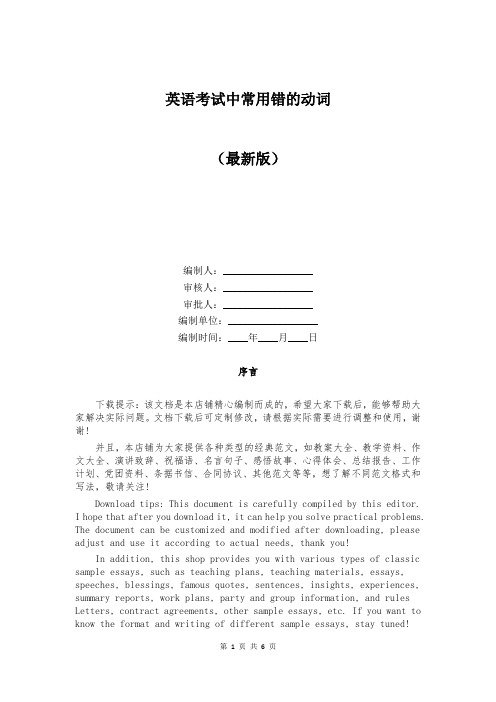
英语考试中常用错的动词(最新版)编制人:__________________审核人:__________________审批人:__________________编制单位:__________________编制时间:____年____月____日序言下载提示:该文档是本店铺精心编制而成的,希望大家下载后,能够帮助大家解决实际问题。
文档下载后可定制修改,请根据实际需要进行调整和使用,谢谢!并且,本店铺为大家提供各种类型的经典范文,如教案大全、教学资料、作文大全、演讲致辞、祝福语、名言句子、感悟故事、心得体会、总结报告、工作计划、党团资料、条据书信、合同协议、其他范文等等,想了解不同范文格式和写法,敬请关注!Download tips: This document is carefully compiled by this editor.I hope that after you download it, it can help you solve practical problems. The document can be customized and modified after downloading, please adjust and use it according to actual needs, thank you!In addition, this shop provides you with various types of classic sample essays, such as teaching plans, teaching materials, essays, speeches, blessings, famous quotes, sentences, insights, experiences, summary reports, work plans, party and group information, and rules Letters, contract agreements, other sample essays, etc. If you want to know the format and writing of different sample essays, stay tuned!英语考试中常用错的动词英语考试中常用错的动词【问题分类】1.主语和宾语的位置(常见翻译中)例如:他没有参加这次面试,因此失去了一份薪水丰厚的工作。
易错点13 易混动词(短语)辨析(三)(解析版)

易错点13易混动词(短语)辨析(三)【难点突破】Group 1put on, put out, put off, put up, put awayGroup 2turn on, turn off, tun up, turn down, turn outGroup 3take up, take away, take off, take in, take down,take outGroup 4give out, give up, give away, give in, give offGroup 5get on, get off, get in/out of , get on(along) with, get away,Group 6look up, look out, look out of, look after, look down upon(on), look through Group 7set out, set off, set up, set downGroup 8think of, think about, think over, think upGroup 9try on, try to do, try doing,try out, try out forGroup 10used to do; be/get used to doing; be used to do, be used forput on穿上,戴上,举办;put up张贴,搭建;put off推迟;put out熄灭; put away放好,收好1.Recently, a series of classic exhibitions have been ________ at Anhui Art Museum.A.put up B.put away C.put on D.put through2.The football match will be ________ because of the bad weather.A.put up B.put off C.put away3.—Excuse me, sir. We can’t smoke here.—Sorry, I ________ see the sign. I’ll ________ my cigarette (香烟) at once.A.don’t; put away B.didn’t; put out C.can’t; put up D.won’t; put off4.—They _______ many pictures of wild animals on the walls. Do you know why?— Yes. Because they hope more people can know them and protect them.A.put away B.put on C.put in D.put up5.Don’t eat too much junk food, or you will ________ weight.A.put away B.put up C.put on D.put off1.C【详解】句意:最近,安徽美术馆举办了一系列经典展览。
动词易错题荟萃
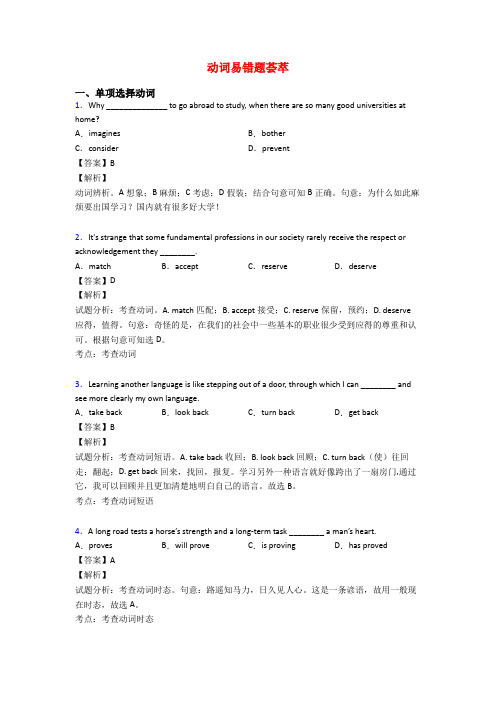
动词易错题荟萃一、单项选择动词1.Why ______________ to go abroad to study, when there are so many good universities at home?A.imagines B.botherC.consider D.prevent【答案】B【解析】动词辨析。
A想象;B麻烦;C考虑;D假装;结合句意可知B正确。
句意:为什么如此麻烦要出国学习?国内就有很多好大学!2.It's strange that some fundamental professions in our society rarely receive the respect or acknowledgement they ________.A.match B.accept C.reserve D.deserve【答案】D【解析】试题分析:考查动词。
A. match匹配;B. accept接受;C. reserve保留,预约;D. deserve 应得,值得。
句意:奇怪的是,在我们的社会中一些基本的职业很少受到应得的尊重和认可。
根据句意可知选D。
考点:考查动词3.Learning another language is like stepping out of a door, through which I can ________ and see more clearly my own language.A.take back B.look back C.turn back D.get back【答案】B【解析】试题分析:考查动词短语。
A. take back收回;B. look back回顾;C. turn back(使)往回走;翻起;D. get back回来,找回,报复。
学习另外一种语言就好像跨出了一扇房门,通过它,我可以回顾并且更加清楚地明白自己的语言。
动词易错题及解析.docx

动词易错题及解析一、单项选择动词1.That sound doesn’ t _______ in his native language, so it is difficult for him to pronounce it. A. owe B.occurC. take place D. happen【答案】 B【解析】【解】A. owe 欠B. occur 存在,出C. take place 生D. happen 生。
句意:那个声音在他的母中不存在,所以他来很音。
occur v. 存在,故B。
2.----- It ’ s a pity that Nelson Mandela passed away.------ But he will __________ in the memories of people worldwide.A. live on B.stay on C. go on D. put on【答案】 A【解析】 A 考短。
句意:--很憾,曼德拉去世了。
--但他将留在世界各地的人的中。
A 以⋯生,靠⋯ 食; B 停留; C ; D 穿上。
故A。
点睛:要学会短的律,以便在英学中达到中‘ 字不字,先半个字’的境界。
具体: 1.在每个部分找出自己最熟悉或者最理解的短,并根据短助体意思; 2.熟本身所具有的全部意思; 3.重点根据小品在中的体意思合本身的意思,理解自己最不理解和不熟悉的短 4.脱离,只看英短,并放到具体句子和景中短 5.注意有些短意很接近, 要合例句和上下文掌握它的用法3.The TV Dwelling Narrowness (居 ) is really fantastic. The show has succeeded in ________ much to the audience, which has contributed to its success.A. touching on B. diving in C.getting across D.going about 【答案】C【解析】考。
(英语)英语动词基本形式易错剖析及解析
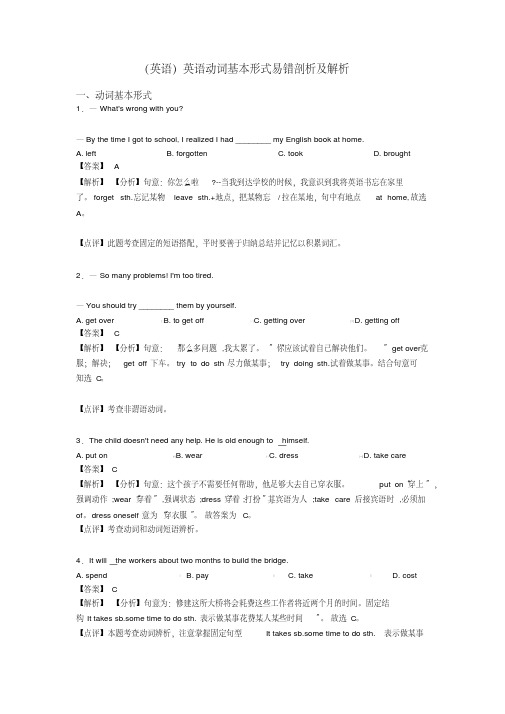
(英语)英语动词基本形式易错剖析及解析一、动词基本形式1.— What's wrong with you?— By the time I got to school, I realized I had ________ my English book at home.A. leftB. forgottenC. tookD. brought【答案】 A【解析】【分析】句意:你怎么啦?--当我到达学校的时候,我意识到我将英语书忘在家里了。
forget sth.忘记某物leave sth.+地点,把某物忘/拉在某地,句中有地点at home,故选A。
【点评】此题考查固定的短语搭配,平时要善于归纳总结并记忆以积累词汇。
2.— So many problems! I'm too tired.— You should try ________ them by yourself.A. get overB. to get offC. getting overD. getting off【答案】 C【解析】【分析】句意:“那么多问题,我太累了。
”“你应该试着自己解决他们。
”get over克服;解决;get off下车。
try to do sth尽力做某事;try doing sth.试着做某事。
结合句意可知选C。
【点评】考查非谓语动词。
3.The child doesn't need any help. He is old enough to himself.A. put onB. wearC. dressD. take care【答案】C【解析】【分析】句意:这个孩子不需要任何帮助,他足够大去自己穿衣服。
put on“穿上”,其宾语为人;take care后接宾语时,必须加强调动作;wear“穿着”, 强调状态;dress“穿着;打扮”,of。
dress oneself意为“穿衣服”。
【英语】动词考点易错点的总结
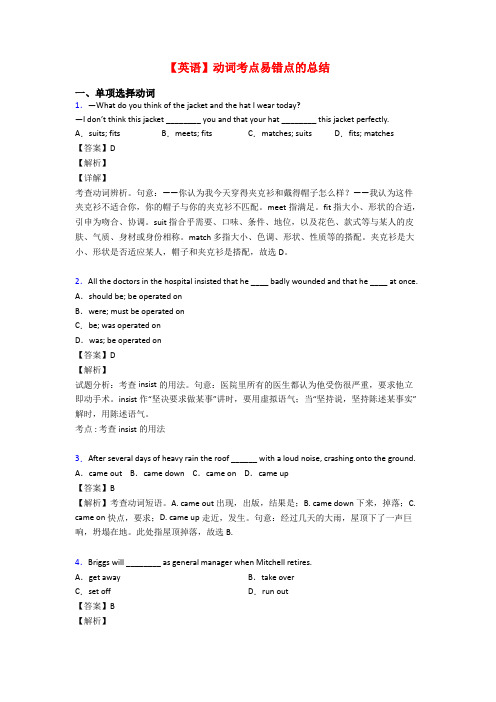
【英语】动词考点易错点的总结一、单项选择动词1.—What do you think of the jacket and the hat I wear today?—I don’t think this jacket ________ you and that your hat ________ this jacket perfectly. A.suits; fits B.meets; fits C.matches; suits D.fits; matches【答案】D【解析】【详解】考查动词辨析。
句意:——你认为我今天穿得夹克衫和戴得帽子怎么样?——我认为这件夹克衫不适合你,你的帽子与你的夹克衫不匹配。
meet指满足。
fit 指大小、形状的合适,引申为吻合、协调。
suit 指合乎需要、口味、条件、地位,以及花色、款式等与某人的皮肤、气质、身材或身份相称。
match 多指大小、色调、形状、性质等的搭配。
夹克衫是大小、形状是否适应某人,帽子和夹克衫是搭配,故选D。
2.All the doctors in the hospital insisted that he ____ badly wounded and that he ____ at once. A.should be; be operated onB.were; must be operated onC.be; was operated onD.was; be operated on【答案】D【解析】试题分析:考查insist的用法。
句意:医院里所有的医生都认为他受伤很严重,要求他立即动手术。
insist作“坚决要求做某事”讲时,要用虚拟语气;当“坚持说,坚持陈述某事实”解时,用陈述语气。
考点 : 考查insist的用法3.After several days of heavy rain the roof ______ with a loud noise, crashing onto the ground. A.came out B.came down C.came on D.came up【答案】B【解析】考查动词短语。
2011年成人高考英语常见错误类型
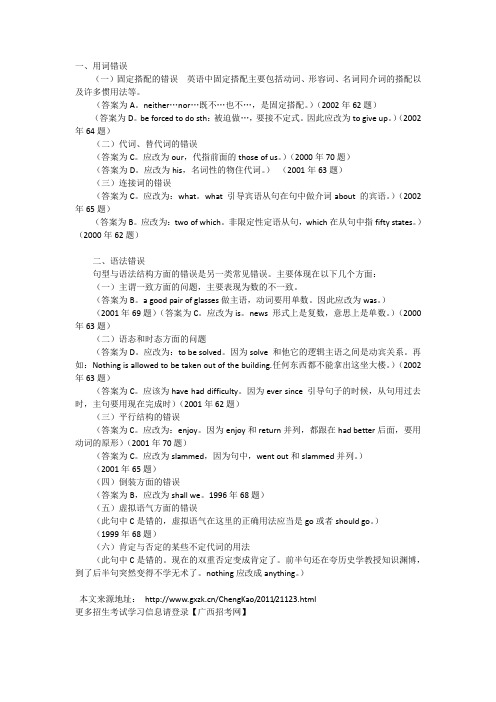
一、用词错误(一)固定搭配的错误英语中固定搭配主要包括动词、形容词、名词同介词的搭配以及许多惯用法等。
(答案为A。
neither…nor…既不…也不…,是固定搭配。
)(2002年62题)(答案为D。
be forced to do sth:被迫做…,要接不定式。
因此应改为to give up。
)(2002年64题)(二)代词、替代词的错误(答案为C。
应改为our,代指前面的those of us。
)(2000年70题)(答案为D。
应改为his,名词性的物住代词。
)(2001年63题)(三)连接词的错误(答案为C。
应改为:what。
what 引导宾语从句在句中做介词about 的宾语。
)(2002年65题)(答案为B。
应改为:two of which。
非限定性定语从句,which在从句中指fifty states。
)(2000年62题)二、语法错误句型与语法结构方面的错误是另一类常见错误。
主要体现在以下几个方面:(一)主谓一致方面的问题,主要表现为数的不一致。
(答案为B。
a good pair of glasses做主语,动词要用单数。
因此应改为was。
)(2001年69题)(答案为C。
应改为is。
news 形式上是复数,意思上是单数。
)(2000年63题)(二)语态和时态方面的问题(答案为D。
应改为:to be solved。
因为solve 和他它的逻辑主语之间是动宾关系。
再如:Nothing is allowed to be taken out of the building.任何东西都不能拿出这坐大楼。
)(2002年63题)(答案为C。
应该为have had difficulty。
因为ever since 引导句子的时候,从句用过去时,主句要用现在完成时)(2001年62题)(三)平行结构的错误(答案为C。
应改为:enjoy。
因为enjoy和return并列,都跟在had better后面,要用动词的原形)(2001年70题)(答案为C。
2011高考英语 短文改错错误类型归纳教案
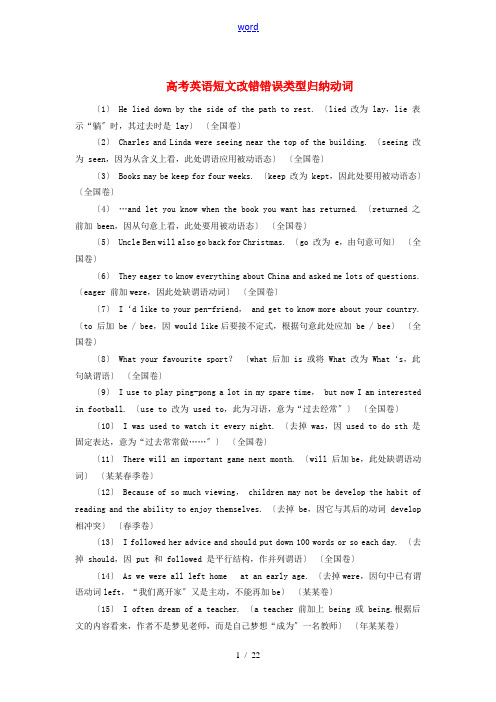
高考英语短文改错错误类型归纳动词〔1〕 He lied down by the side of the path to rest. 〔lied 改为 lay,lie 表示“躺〞时,其过去时是 lay〕〔全国卷〕〔2〕 Charles and Linda were seeing near the top of the building. 〔seeing 改为 seen,因为从含义上看,此处谓语应用被动语态〕〔全国卷〕〔3〕 Books may be keep for four weeks. 〔keep 改为 kept,因此处要用被动语态〕〔全国卷〕〔4〕…and let you know when the book you want has returned. 〔returned 之前加 been,因从句意上看,此处要用被动语态〕〔全国卷〕〔5〕 Uncle Ben will also go back for Christmas. 〔go 改为 e,由句意可知〕〔全国卷〕〔6〕 They eager to know everything about China and asked me lots of questions. 〔eager 前加were,因此处缺谓语动词〕〔全国卷〕〔7〕I‘d like to your pen-friend, and get to know more about your country. 〔to 后加 be / bee,因 would like后要接不定式,根据句意此处应加 be / bee〕〔全国卷〕〔8〕 What your favourite sport?〔what 后加 is 或将 What 改为What‘s,此句缺谓语〕〔全国卷〕〔9〕 I use to play ping-pong a lot in my spare time, but now I am interested in football. 〔use to 改为 used to,此为习语,意为“过去经常〞〕〔全国卷〕〔10〕 I was used to watch it every night. 〔去掉 was,因 used to do sth 是固定表达,意为“过去常常做……〞〕〔全国卷〕〔11〕 There will an important game next month. 〔will 后加be,此处缺谓语动词〕〔某某春季卷〕〔12〕 Because of so much viewing, children may not be develop the habit of reading and the ability to enjoy themselves. 〔去掉 be,因它与其后的动词 develop 相冲突〕〔春季卷〕〔13〕 I followed her advice and should put down 100 words or so each day. 〔去掉 should,因 put 和 followed 是平行结构,作并列谓语〕〔全国卷〕〔14〕 As we were all left home at an early age. 〔去掉were,因句中已有谓语动词left,“我们离开家〞又是主动,不能再加be〕〔某某卷〕〔15〕 I often dream of a teacher. 〔a teacher 前加上 being 或 being.根据后文的内容看来,作者不是梦见老师,而是自己梦想“成为〞一名教师〕〔年某某卷〕〔16〕 Without enough knowledges, you can never learn well.〔learn改为teach,因上句讲“为了教好,教师不得不学〞,此句便是“没有学问,就决不会教好〞〕〔年某某卷〕主谓一致〔1〕 Bill was standing at the side of the car, talking to two men who was helping him to repair it. 〔was 改为 were,因先行词 two men 是复数,所以修饰该先行词的定语从句的谓语动词也应用复数〕〔全国卷〕〔2〕 Playing football not only makes us grow up tall and strong but also give us a sense of fair play and team spirit. 〔give 改为 gives,它与makes 为平行结构,构成并列谓语动词〕〔全国卷〕〔3〕 Now my picture and the prize is hanging in the library. 〔is 改为 are,因主语是 my picture and the prize,故谓语动词要用复数〕〔全国卷〕〔4〕 But then there is always more mysteries to look into. 〔is 改为 are,因其后的 mysteries 为复数,故谓语动词要用复数〕〔春季卷〕〔5〕 But not allinformation are good to society. 〔are改为is,因为主语是不可数名词information,表单数〕〔某某卷〕〔6〕 So then, a concert cost so much. I may just listen to music. 〔cost 改为costs,因主语是单数a concert,根据全文用的都是现在的时态,故用一般现在时〕〔年某某卷〕〔7〕 If I listen to my own records, there are no need to spend money. 〔are 改为is,因为在there be结构中的be用is还是用are,由紧跟在be后的那个名词的单复数来决定,此处no need是单数,所以用is〕〔某某卷〕〔8〕…you will probably want to join the Stamp Collectors‘ Club which exist to add more stamps to your collection. 〔exist改为exists,因主语which是指the Stamp Collectors’ Club,这是单数,所以用exists〕〔某某卷〕〔10〕 One evening she told me that something happened when their parents was out. 〔was改为were,因为主语their parents是复数,所以不用was要用were〕〔年某某卷〕时态〔1〕We were driving along a narrow road when the car stop…〔stop改为stopped〕〔全国卷〕〔2〕…and had returned to the car! Bill is standing at the side of the car 〔is 改为 was〕〔全国卷〕〔3〕 Two months ago they were back in America. Last Sunday, police cars hurry to the…〔hurry 改为 hurried〕〔全国卷〕〔4〕 Today, it is much easier to be healthy than it is in the past. 〔第二个is 改为 was〕〔全国卷〕〔5〕 Also, scientists and doctors had learned how to deal with many diseases. 〔had 改为 have〕〔全国卷〕〔6〕 Anyone may borrow books, and it cost nothing to borrow them. 〔cost 改为 costs〕〔全国卷〕〔7〕 If the book you will want is out, you may ask for it to be called back for you. 〔去掉 will〕〔全国卷〕〔8〕 I had always wanted to return to the village after moving away and it is really great to see most of my old friends again. 〔is 改为 was〕〔全国卷〕〔9〕 They offered me coffee and other drinks. We have a good time talking and laughing together. 〔have 改为 had〕〔全国卷〕〔10〕 I learn about you from my English teacher, Miss Fang. 〔learn 改为learned〕〔全国卷〕〔11〕 My favourite sport is football. I was a member of our school football team. 〔was 改为 is〕〔全国卷〕〔12〕 I am happy with any programme but the others spent a lot of time arguing and there was no way of settling the matter except by selling the set. 〔am 改为was〕〔全国卷〕〔13〕I‘d like very much to e but I had an examination on Monday morning. It is a very… 〔had 改为have〕〔春〕〔14〕 I remembered her words and calm down. 〔calm改为calmed〕〔全国卷〕〔15〕 They did not want me to do any work at home; they want me to devote all my time to… 〔did 改为 do〕〔全国卷〕〔16〕 He said he is busy. 〔is 改为 was〕〔春〕〔17〕 On the way up I was busy taking pictures since the scenery was so beautiful. The time passes quickly. 〔passes 改为 passed〕〔全国卷〕〔18〕 But his parents think going to college is more important than playing sports and college was the only place for a smart boy like his son. 〔was 改为 is〕〔某某卷〕〔19〕 At once I apologize and controlled myseff at my best till the dinner started.〔apologize改为 apologized〕〔某某卷〕〔20〕 Sometimes, we talked to each other very well in class, but after class we bee stranger at once. 〔talked改为 talk〕〔全国卷〕〔21〕 She stopped to look out of the window and find a cloud of smoke ing out of her neighbor‘s house. 〔find改为 found〕〔某某卷〕〔22〕 We were living in a big family. We treat each other as brothers and sisters. 〔treat改为 treated〕〔某某卷〕〔23 I am always young when I was staying with them. 〔am改为 was〕〔某某卷〕名词〔1〕 We stopped to rest for a while and to drink some waters from a stream. 〔waters 改为water,因“水〞为物质名词,不可数〕〔全国卷〕〔2〕 We climb everywhere, not only in America. We have been to Europe many time. 〔time改为 times,many times 意为“许多次〞〕〔全国卷〕〔3〕 There are branch library in many villages. 〔library 改为 libraries,因其前的谓语are为复数〕〔全国卷〕〔4〕 I hope that you two could e and visit us some times soon. 〔times 改为time,some time 意为“某时〞〕〔全国卷〕〔5〕 Today I visited the Smiths — my first time visit to an American family. 〔去掉time,因first 已含有“次〞的意思〕〔全国卷〕〔6〕 They were eager to know everything about China and asked me lots of question. 〔question 改为 questions,因其前有表示复数意义的修饰语 lots of〕〔全国卷〕〔7〕 We study quite a few subject, such as maths, Chinese, English and physics. 〔subject 改为 subjects,因 a few 后应接复数可数名词〕〔全国卷〕〔8〕…and often watch football match o n TV together. 〔match 改为 matches〕〔全国卷〕〔9〕 Happy birthday, Peter, and many happy return of the day!〔return改为 returns,many happy returns of the day!为祝贺生日的惯用表达〕〔春季卷〕〔10〕 She said that she and my schoolmate all wished me success. 〔schoolmate 改为 schoolmates,因校友不只一个,另外根据其后的 all 也可推知〕〔全国卷〕〔11〕 I used to love science class — all of them— biology, chemistry,geography, physics. 〔class 改为 classes,指其后提到的所有课程〕〔春季卷〕〔12〕 They did not want me to do any work at family. 〔family 改为 home,因at home 为固定短语〕〔全国卷〕〔13〕…so that I‘ll get good marks in all my subject. 〔subject 改为 subjects,请注意前面的 all〕〔全国卷〕〔14〕 On the way up I was busy taking picture since the scenery was so beautiful. 〔picture 改为 pictures,picture 作为可数名词,其前应有限定词,或为复数形式〕〔全国卷〕〔15〕 No one worries much about the radio program young people listen to. 〔program 改为 programs,从句意上看,此处应用复数〕〔春季卷〕〔16〕 Their word were a great encouragement to me. 〔word 改为 words,注意其后的复数动词〕〔全国卷〕〔17〕 You know,that was a dinner we had waited for several month.“〔month 改为 months,因 several 后要用可数名词的复数形式〕〔某某卷〕〔18〕…but after class we bee stranger at once.〔stranger改为strangers,由本行前面的we可知应该用名词复数〕〔全国卷〕〔19〕 You can find all kinds of information in just a few minute on the Internet. 〔minute改为minutes,因为a few后面的名词一定是复数〕〔某某卷〕〔20〕 Nowadays mi llions of people of all age take pleasure in a hobby…〔age 改为ages,因谈到不止一个人的年龄,age用复数;of all ages指各个年龄阶段的人〔某某卷〕〔21〕She was doing her homeworks one Sunday morning when… 〔homeworks改为homework,因它是不可数名词,没有复数形式〕〔某某卷〕〔22〕 Without enough knowledges, you can never teach well. 〔knowledges 改为knowledge,因 knowledge是不可数名词,没有复数形式〕〔某某卷〕形容词与副词〔1〕 After an hour or so we began to feel very frightening. 〔frightening 改为 frightened,因它表示某人感到害怕,而不是令人害怕〕〔全国卷〕〔2〕 Charles said,“As soon as I see a realy tall building, I want to climb it. 〔realy 改为 really 或 real,假设改为 really,那么修饰 tall;假设改为 real,那么修饰 building〕〔全国卷〕〔3〕 Last Sunday, police cars hurry to the taller building in New York. 〔taller 改为 tallest,因从含义上看此处应是最高级〕〔全国卷〕〔4〕 As a result, people in the modern world generally live much more longer than people in the past. 〔去掉 more,因为 longer 本身已是比较级,不能再受 more 修饰〕〔全国卷〕〔5〕 Therefore, there are still some countries where people have shorter lives. 〔Therefore 改为 However,因此处语意转折〕〔全国卷〕〔6〕 People in industrial countries can expect to live for twice so long as people who lived a few hundred years ago. 〔so long as 改为 as long as,其意为“与……一样长〞〕〔全国卷〕〔7〕 In some places you may borrow many books as you want. 〔many 之前加 as,因as …… as 结构不完整〕〔全国卷〕〔8〕 I told Mother, Father, Sister and all my friends here that a great time I had. 〔that 改为 what〕〔全国卷〕〔9〕 I never knew a ride down a river could be so much exciting. 〔去掉 much,因 much 不能用来修饰形容词的原级,尽管它可用来修饰比较级和最高级〕〔全国卷〕〔10〕I‘m sure we’ll have a wonderfully time together. 〔wonderfully 改为wonderful,因它是放在名词前作定语〕〔全国卷〕〔11〕 First, let me tell you something more about myself. 〔去掉 more,因从上下文看,这是第一次给对方写信,不存在谈谈“更多情况〞的问题〕〔全国卷〕〔12〕 I used to play ping-pong a lot in my spare time, but now I am interesting in football. 〔interesting 改为 interested,be interested in 意为“对……感兴趣〞〕〔全国卷〕〔13〕 Also, the sport teaches us the important of obedience. 〔important 改为 importance,teach 后可接名词或代词作宾语,但不接形容词作宾语〕〔全国卷〕〔14〕 Unfortunate, there are too many people in my family. 〔Unfortunate 改为 Unfortunately,因此处要求用副词作状语〕〔全国卷〕〔15〕 I think I liked those classes because I felt that they helped me understand what the world works. 〔what 改为 how,how 在此表示方式〕〔春季卷〕〔16〕 After learning the basics of the subject, nothing else seemed very practically to me. 〔practically 改为 practical,此处用形容词作表语〕〔春季卷〕〔17〕 Whenever I see them I will often think of my English teacher. 〔去掉 often,因句中的whenever 与 often 意义重复〕〔全国卷〕〔18〕 What things are in other homes, I wonder. 〔What 改为 How,句意为“不知其他家庭的情况是怎样的〞〕〔全国卷〕〔19〕 For instance, one night he played strong and loudly music till four o‘clock in the morning. 〔loudly 改为 loud,与 strong 并列作定语,修饰 music〕〔春季卷〕〔20〕 But he is difference now. 〔difference改为different,即用形容词作表语〕〔春季卷〕〔21〕 The time passes quickly. Evening came down. 〔去掉 down,要表示“夜幕来临〞,直接说 Evening came 即可〕〔全国卷〕〔22〕…although radios can be very noise. 〔noise 改为 noisy,即用形容词作表语〕〔春季卷〕〔23〕…all planned and written by grown-ups to make children want things that they don‘t real need. 〔real 改为 really,修饰动词要用副词〕〔春季卷〕〔24〕 But one of the best players in our team told me just then that he wouldn‘t play basketball any more. 〔then 改为 now,just now 为习语,意为“刚才〞〕〔某某春季卷〕〔25〕But one of the best players in our team told me just now that he wouldn‘t play basketball once more. 〔once 改为 any,not … any more为习语,意为“不再〞〕〔某某卷〕〔26〕 I would describe myself as shy and quietly. 〔quietly 改为quiet,and 连接并列成分quite和shy〕〔全国卷〕〔27〕 Finding information on the Net is easily. 〔easily改为easy,作表语要用形容词〕〔年某某卷〕〔28〕 Yes, a concert can be very excited. 〔excited改为exciting,表示某事物是“令人兴奋的〞用exciting;表示某人“感到兴奋〞才用excited〕〔某某卷〕〔30〕 Nowadays millions of people of all age take pleasure in a hobby which is both interested and fun. 〔interested 改为 interesting,指某事物是“令人有趣的〞,用interesting,表示某人“对…感兴趣〞时,用interested〕〔某某卷〕〔31〕 She called 119 immediate. 〔immediate改为immediately,用作状语,要用副词〕〔某某卷〕〔32〕 However, we seldom felt lonely or helplessly. 〔helplessly改为helpless,在系动词felt后作表语,要用形容词〕〔某某卷〕介词〔1〕 Bill insisted in staying near the car. 〔in 改为 on,insist on 为固定搭配〕〔全国卷〕〔2〕 Suddenly we caught sight at a car and some men. 〔at 改为 of,catch sight of是习语,意为“看见〞〕〔全国卷〕〔3〕 When I have free time I go a long walk. 〔go 后加 for,go for a walk 是习语〕〔全国卷〕〔4〕 When they came down the police were angry to them. 〔to 改为 with,要表示对某人生气,英语习惯上用be angry with sb〕〔全国卷〕〔5〕 Most people can quickly get for help from a doctor or go to a hospital since they are ill. 〔去掉 for,因其前的 get 是及物动词〕〔全国卷〕〔6〕…and some books, for example, books for history, science, cooking and gardening are also popular. 〔books for 改为 books on,此处的 on 意为“关于〞〕〔全国卷〕〔7〕 I never knew about a ride down a river could be so exciting. 〔去掉 about 或将 about 改为 that,因动词 knew 后可直接跟宾语从句,无需用介词〕〔全国卷〕〔8〕 It was very kind for them to meet me at the railway station. 〔for 改为 of,注意句型It‘s kind of sb to do sth〕〔全国卷〕〔9〕 In fact, they are planning to visit China in next year. 〔去掉 in,在由 next, this, last 等构成的时间短语中,一般可直接用作时间状语,无需加 in, on,at 这样的介词〕〔全国卷〕〔10〕 We practise for three times every week. 〔去掉 for,在表示频率的名词前通常不加介词〕〔全国卷〕〔11〕 We must keep in mind that we play for the team instead ourselves. 〔instead 后加 of,instead of 为复合介词,在此表示“而不是〞〕〔全国卷〕〔12〕 Unfortunately, there are too many people among my family. 〔among 改为 in,in my family 意为“在我家里〞〕〔全国卷〕〔13〕I was happy with any programme but the others spent a lot time arguing…〔a lot 后加 of,因 a lot 不能直接修饰名词〕〔全国卷〕〔14〕 Thanks very much on inviting me to your birthday party on Sunday. 〔on 改为 for,thanks for doing sth 意为“因某事而感谢某人〞〕〔春季卷〕〔15〕So I‘m really sorry that I won’t be able to e in this time. 〔去掉 in,因 this time 可直接用作状语〕〔春季卷〕〔16〕…but we do not seem to get much time to talk about together. 〔去掉 about,因 about 后没有接宾语,about 属多余〕〔全国卷〕〔17〕 For instance, on one night he played strong and loud music till four o‘clock in the morning. 〔去掉 on,因 one night 可直接用作状语〕〔春季卷〕〔18〕 I was so tired that I fell asleep at the moment my head touched the pillow. 〔去掉 at,the moment 在此用作连词,相当于 as soon as〕〔全国卷〕〔19〕 His parents asked him to spend in more time preparing for the college entrance examination. 〔去掉 in,spend 是及物动词,其后可直接跟名词作宾语〕〔某某春季卷〕〔20〕 I feel sorry to him. 〔to 改为 for,be / feel sorry for sb 意为“为某人感到难过〞〕〔某某春季卷〕〔21〕 Because so much viewing, children may not develop the habit of reading and the ability to enjoy themselves. 〔Because 后加 of,因 so much viewing 相当于名词〕〔春季卷〕〔22〕 On one year the average child will see 25,000 television mercials…〔On 改为 In,意为“在一年中〞〕〔春季卷〕〔23〕The main problem was in that I always thought in Chinese… 〔去掉 that 前的 in,was 后是一个以 that 引导的宾语从句,in 是多余的〕〔全国卷〕〔24〕I‘m sure they will laugh to me and see me as a fool. So I feel unhappy every day. 〔to 改为 at,laugh at 意为“嘲笑〞〕〔全国卷〕〔25〕 You can find all kinds information in just a few minutes on the Internet. 〔kinds 后加 of,a kind of 意为“一种……〞,all kinds of…意为“各种各样的……〞〕〔某某卷〕〔26〕 But I have spent lots my money,… 〔lots后加of,lots / a lot后不能接名词;后接名词时,要用lots of…,a lot of…〕〔某某卷〕〔27〕…you will probably want to join in the Stamp Collectors‘ Club…〔去掉 in,表示“参加,加入〞某个组织,join 后不要再加介词 in;表示“参加〞某项活动时,才加 in〕〔某某卷〕〔28〕 We have a lot on mon and have a lot to talk about. 〔on 改为 in,因为have sth in mon 是固定搭配,意为“有共同的……〞〕〔某某卷〕从句及并列连词高考英语短文改错考点解析:从句〔1〕In the last five years that they‘ve climbed churches, high buildings and television towers. 〔去掉 that,因此处的 in the last five years 为时间状语,其后无需用that〕〔全国卷〕〔2〕 Charles said,“As soon I see a really tall building, I want to climb it.〔I 前加 as,因为 as soon as 为引导时间状语从句的引导词〕〔全国卷〕〔3〕 Most people can quickly get help from a doctor or go to a hospital since they are ill. 〔since 改为 when / if / whenever.从句意上看此处用 since 讲不通,改为 if / when / whenever 均可〕〔全国卷〕〔4〕 However, there are still some countries there people have shorter lives. 〔there 改为 where,where 在此引导定语从句〕〔全国卷〕〔5〕…in other places where you are limited to a certain number, of which some may be novels. 〔去掉 where,in other places 在此为地点状语〕〔全国卷〕〔6〕…in other places you are limited to a ce rtain number, of that some may be novels. 〔that 改为 which,因介词后要用 which 来引导定语从句〕〔全国卷〕〔7〕…and whether you pay the cost of sending a postcard, the librarian will write to you. 〔whether 改为 if,表示“如果〞时,不能用 whether〕〔全国卷〕〔8〕 I also enjoyed the evenings when we spent together. 〔去掉 when 或将 when 改为 that,因这里的定语从句中谓语动词〔spent〕缺宾语,故只能用关系代词 that或将其省略〕〔全国卷〕〔9〕 I live in Beijing, where is the capital of China. 〔where 改为 which,因此处要填关系代词作主语〕〔全国卷〕〔10〕…but it didn‘t matter that I would win or not. 〔that 改为 whether,whether 与 or not 搭配,表示“是否〞〕〔全国卷〕〔11〕 I felt so nervous as I shook like a leaf. 〔as 改为 that,so…that…为固定句式,其中的 that 引导结果状语从句〕〔全国卷〕〔12〕 In one class, I learned it rained. 〔it 前加why,why 在此表原因〕〔春季卷〕〔13〕 For example, when he bought a chocolate cake, he put it in a secret place where I couldn‘t find. 〔where 改为that / which,或去掉 where,I couldn’t find 为修饰 place 的定语从句,其前用关系代词,也可省略〕〔春季卷〕〔14〕 It was about noon we arrived at the foot of the mountain. 〔we 前加 when,时间状语从句缺少连词引导〕〔全国卷〕〔15〕 Besides, I have few friends, I d on‘t know that they don’t like to talk with me. 〔that 改为 why,why 引导宾语从句,表示原因〕〔年全国卷〕〔16〕I have a good friend who‘s name is Liu Mei. 〔who’s 改为 whose,因who‘s=who is,不仅结构错误,而且意思也不通;whose 引导定语从句,表示“……的〞〕〔某某卷〕〔17〕 It has been five years when we graduated, but those memories are as sweet as ever before. 〔when 改为 since,It is / has been +时间段+since〔谓语动词是短暂性动词〕是固定句型,意为“自……以来有多久了〞〕〔年某某卷〕高考英语短文改错考点类析:并列连词〔1〕 We tried to fix it and there was nothing we could do. 〔and 改为 but,因此处语意转折〕〔全国卷〕〔2〕 I told Mother, Father, Sister, all my friends here what a great time I had. 〔all 前加 and,表示并列关系〕〔全国卷〕〔3〕It is a very important exam but I can‘t afford to fail it. 〔but 改为and / so,此处表因果关系,并非转折关系〕〔春季卷〕〔4〕 She was smiling but nodding at me. 〔but 改为 and,因此处并无转折之意〕〔全国卷〕〔5〕 It looks as if my parents treat me as a visitor and a guest. 〔and 改为 or,a visitor 和 a guest 应是选择关系,意思是“好像我的父母亲把我当作一个来访者或一个客人〞〕〔6〕 The food was expensive and the service was good. 〔and 改为 but,此处意义发生转折〕〔全国卷〕〔7〕I‘m the captain of our school team so with my fellow players we’ve won several games. 〔so 改为 and,表并列关系〕〔某某春季卷〕〔8〕 My grandma was the best cook in the world but could make the most delicious dishes.〔but 改为and,此处表示并列,而不是转折〕〔某某卷〕〔9〕So once you‘ve started collecting seriously,you… 〔So 改为 But,因为前后是转折关系〕〔年某某卷〕〔10〕 Clever as she is, but she works very hard. 〔去掉but,因前面已有引导让步状语从句的连词 as〔=though 虽然〕,千万不要受汉语句式“虽然……但是……〞的影响,而重复用连词〕〔某某卷〕〔11〕 I teach them, play with them, but watch them growing up.〔but 改为and,因为 teach / play 与 watch 是并列关系,而不是转折关系〕〔某某卷〕冠词〔1〕 After a hour or so we began to feel very frightened. 〔a 改为 an,因 hour 读音以元音开头〕〔全国卷〕〔2〕 I decided to climb the tree to see where we were. 〔the 改为 a,因此处并非特指,而是泛指〕〔全国卷〕〔2〕 Some people read the books or watch television while others have sports. 〔去掉 the,因这里的 books 表泛指,不表特指〕〔全国卷〕〔3〕Good health is person‘s most valuable possession. 〔person’s 前加 a,这里的 a 表泛指〕〔全国卷〕〔4〕 Modern people know more about the health, have better food, and live in clearer surroundings. 〔去掉 the,因health 表泛指〕〔全国卷〕〔5〕 There is public library in every town in Britain. 〔public library 前加 a,因这里的 public library 是单数可数名词表泛指,故在其前用 a〕〔全国卷〕〔6〕 Maybe you could e during a winter holidays. 〔a 改为 the,因从含义上看,此处的 winter holidays 属特指或者是谈话双方都知道的〕〔全国卷〕〔7〕 Today I visited the Smiths — my first visit to a American family. 〔a 改为 an,因 American 的读音以元音开头〕〔全国卷〕〔8〕 Each player must obey captain, who is the leader of the team. 〔captain 前加冠词 the,captain 为特指〕〔全国卷〕〔9〕 Some wanted to see the programme while others preferred another. 〔the 改为 one,one 与下一行的 another 构成“一个……另一个〞〕〔全国卷〕〔10〕I‘ll take this chance to wish you wonderful time on your birthday. 〔wonderful 前加 a,该表达与 have a good time 类似,其中的 a 不可省〕〔春季卷〕〔11〕 Suddenly, I caught a sight of my English teacher in the crowd. 〔去掉 a,catch sight of 是习语,意为“看见、瞥见〞〕〔全国卷〕〔12〕 For example, when I was a child, the rain was a mystery〔奥秘〕。
- 1、下载文档前请自行甄别文档内容的完整性,平台不提供额外的编辑、内容补充、找答案等附加服务。
- 2、"仅部分预览"的文档,不可在线预览部分如存在完整性等问题,可反馈申请退款(可完整预览的文档不适用该条件!)。
- 3、如文档侵犯您的权益,请联系客服反馈,我们会尽快为您处理(人工客服工作时间:9:00-18:30)。
③lie不及物动词,说谎
lie—lied—lied—lying
例句:①Don’t lie to me.
(别骗我。)
②She lies about her career.
(她编造她的经历。)
第二组
hear/listen to
①hear听;是一种“自然无意的动作。”hear of听说过hear from得到消息
第一组
spend/ take /cost
①spend的主语通常是“人”,即“某人在─花多少时间或金钱。”
例句:
1)The boy spends a lot of money.(in) playing computer games.
(那个男孩花了很多钱玩电子游戏。)
2)She spent lots of money on books last year.
(这块手表花了我200块钱。)
2)Writing a novel cost plenty of time.
(写本小说要花很多时间。)
3)The girl's bad behavior cost her parents many sleepless nights.
(那个女孩的不良行为使得她的父母许多夜晚睡不着。)
(上海位于北京的南方。)
②She has lain in bed for three days.
(她已经在床上躺了三天了。)
2)lay及物动词,放置;下蛋
lay—laid—laid—laying
例句:①These hens lay eggs every day.
(这些鸡每天下蛋。)
②He laid his hand on my shoulder.
(那位母亲每天给孩子穿衣服。)此句不能加衣服。
3)She dresses herself in red.
第五组
do /make
①do“做”主要是用来表示“行动”“行为”,如do omelets是“把蛋卷煎好”。在do后面常加一些抽象名词,如do wrong(犯错)。“wrong”是抽象名词常与do搭配的短语有:
(我花了一个小时修理自行车。)
3)It takes a lot of courage to tell the truth.
(说真话需要很大的勇气。)
③cost的主语通常是事物,即指 ①某物值多少钱②需要多少时间③某人花了多少钱④使(某人)(丧失)(事/物)+cost+(人)+时间/金钱
1)The watch cost me two hundred yuan.
2)The Prime Minister spoke on the international situation.
(首相就国际形势发表了演说。)
3)She always speaks ill of others.
(她总是说别人的坏话。)
②speak的习惯用语:
Generally speaking 一般而言
(那些女孩们讲什么?)
2)Young people like to talk politics.
(年青人喜欢谈论政治。)
3)I talked over the matter with her.
(我与她谈论了那个问题。)
第三组
take /bring/carry/fetch
①take作“带去”“拿去”解;从近处把东西送到远处
(昨晚我除了看电视以外什么也没有做。)
8)Who does your hair?
(平常是谁给你做头发的?)
②make“作”,表示“制造”,其后的宾语是make的产品。如make clothes 制做衣服;make后常跟一些可数名词常与make动词搭配的短语有:
①make a
②make an
①do one's
②do (the) some
③do sb. a favor帮人忙
④do with利用;忍受;需要
⑤do away with废除
⑥do without用不着;不需要
⑦have
⑧do sb.
⑨do nothing but do除了做…以外什么也没做
⑩do business做生意
2)Put on the gloves .It's cold outside.
(戴上手套外面很凉。)
③dress作“穿着…的衣服”解;给某人穿衣服不用写衣服
例句:
1)She is dressed in red.
(她穿着红衣服。)
2)The mother dresses the child every day.
2)Fetch the police at once. We've found the robber.
(马上去叫警察来,我们已经发现那个抢劫的人。)
第四组
wear/put on/ dress
①wear穿着,戴;留,表示“状态”是及物动词需加宾语
例句:
1)She always wears a pair of glasses.
(我注意听了,但没听见什么。)
③Listen to me.
(听我说。)
第三组
sit/set/seat
①sit不及物动;坐;就座;
sit—sat—sat—sitting
例句:①He sat at the table writing a letter.
(他坐在书桌旁写信。)
②Sit here until she comes back.
(她总是戴着一副眼镜。)
2)He wears a black jacket today.
(今天他穿着一件黑色的夹克。)
②put on穿上,戴上,表示“动作”
例句:
1)The teacher put on his hat and went out of the office.
(老师戴上帽子然后走出办公室。)
3)She says she is busy.
(她说她很忙。)
4)My watch says 10:00 sharp.
(我的表是十点整。)
5)The paper says that there was a big fire in Shanghai.
(报上说上海发生了一场大火)。
6)It is said that she has been away for a month.
(她总是带一个红色手包。)
2)Please carry this TV set upstairs.
(请把这台电视搬到楼上去。)
④fetch作“去…取来,拿来;叫某人来”解
1)The football is over there. Fetch it please.
(足球在那边呢,请把它拿回来。)
(Tom是个好学生,也就是说,他在学校的成绩很好。)
③ ①tell说谎;讲故事;说实话
1)Don't tell a lie.
(不要说谎。)
2)She likes to tell stories.
(她喜欢讲故事。)
3)We should always tell the truth.
(我们应该永远说实话。)
嘘!(不要出声。)
4)She makes her living as a teacher.
(她作教师来维持生计。)
第一组
lie/lay/lie
1)lie不及物动词,躺;位于
lie—lay—lain—lying
例句:①Shanghai lies to the south of Beijing.
(据说她已走了一个月了)
7)It goes without saying that education is important.
(不用说,教育是重要的。)
8)Tom is a good student, that is to say, he gets good grades in school.
(我们会读英语,汉语更不用说了。)
④say说出某句话或某件事;后接从句,(但say与从句之间不能直接接人称代词或名词);说明时间;书信、布告报纸上的“说”,习惯用法
1)She said ,“I love you.”
(她说:“我爱你。”)
2)Say goodbye to them.
(跟他们说再见。)
例句:
1)I'll do the dishes today.
(今天我来洗盘子。)
2)I've done my homework.
(我已经做完了作业。)
3)Crying does harm to you.
(哭对你没有益处。)
4)Will you do me a favor?
(能否帮我一个忙?)
1)Bring the dictionary to me.
(把字典拿给我。)
2)Please bring your report with you when you come tomorrow.
(明天你来的时候,请把你的报告带来。)
③carry作“携带,带去;搬运”解
1)She always carries a red handbag.
例句:The deaf cannot hear.
(聋子听不见。)
②listen是一种“有意的动作。”如后面有宾语则需加to;如没有宾语,listen后不可加to。
